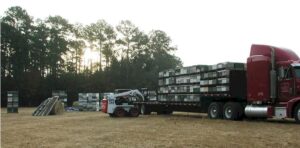
In the US the honeybees in conventional vertical beehives get transported by the truckloads all over the country for pollination of conventional agricultural crops.
Unfortunately, conventional agricultural crops are usually replete with agrochemicals such as pesticides and herbicides affecting both the bees and their honey.
Here’s the news article:
There are significant downsides to renting & transportation of honeybees. In nature, honeybees tend to live in tree hollows of big trees. And the bees stay in the same vicinity gradually adapting to the nectar flows of local plants and developing resilience by coping with mostly familiar challenges in their local environment such as the weather, the predators, and any local diseases.
In addition to unhealthy extreme proximity to hundreds of other beehives during transportation to pollination sites and back, the transported bees struggle to adapt to each new location’s climate, pests and nectar flows.
Typically, transported bees are heavily treated with medications to help them cope with immediate challenges but in the long run such treatment is a double-edged sword: Treatment interferes with natural selection. Medicated bees start relying on continuous human intervention and keep getting weaker while their parasites keep adapting and keep getting stronger.
When heavily treated bees get transported and they swarm and escape and try to become feral, they can turn out to be a real mite bomb endangering all other bees all over the country with their stronger adapted mite-parasites; such bees can also adversely affect the common gene pool with their weakened immunity.
We do not rent or transport our bees.
